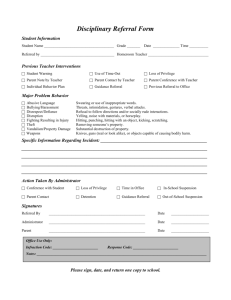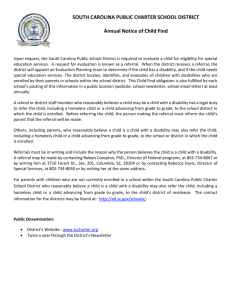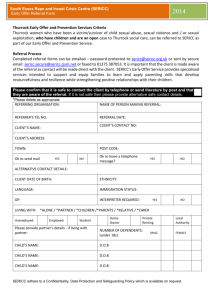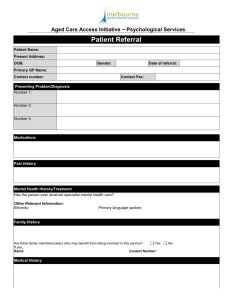PowerPoint Format - Arkansas Disability Coalition
advertisement
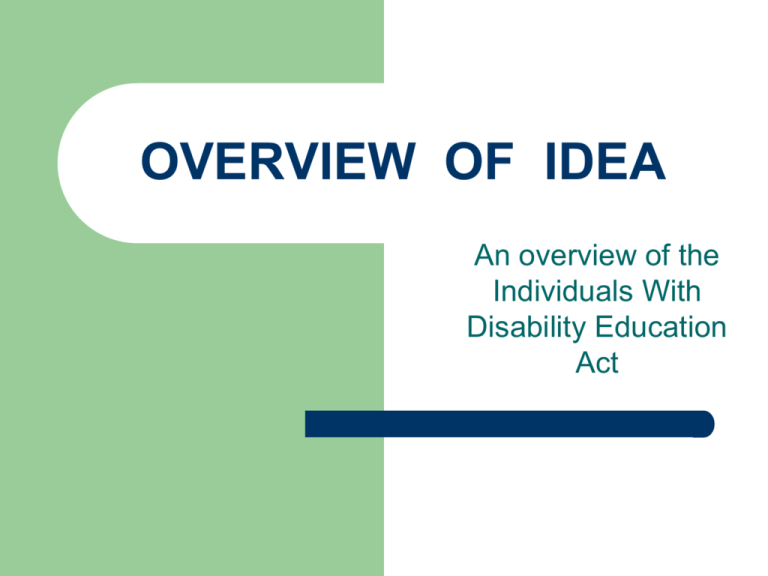
OVERVIEW OF IDEA An overview of the Individuals With Disability Education Act BRIEF HISTORY OF IDEA 1975 Congress enacted the Education for all Handicapped Children Act – ancestor to the Individual Disability Education Act (IDEA) Federal grant money allotted to each state to educate children with disabilities with the condition that states would comply with goals and procedures set forth in the legislation HISTORY CONT. The last amendments were enacted in 2004 and effective in July of 2004. Foundation of legislation remains the same: Ensuring access to a Free Appropriate Public Education (FAPE) Ensuring the child’s and their parent’s rights are protected Assistance to states, educational service agencies, localities, and Federal agencies to provide for the education IDENTIFICATION Often referred to as “child find” Statewide system includes at least the following: Public awareness program with preparation and dissemination by the lead agencies Information provided to parents regarding the availability of early intervention services under Part C (DDS) INDIVIDUAL FAMILY SERVICE PLAN (IFSP) Assessment of strengths and needs of the child and the identification of appropriate services A family directed assessment of the resources, priorities, and concerns of the family A written IFSP developed by a team REFERRAL Collect information that might be interfering with the child’s learning Referral may be made by any individual with pertinent information about the child Referral may be made any time and should be in writing, dated, and copied for parent file Attn.: director of public agency or principal and copy the letter to the special educational supervisor REFERRAL CONT. Upon receipt of the referral request, the school notifies the parent within seven days Referral conference must be held within 21 days from the date of the referral request Referral conference must be attended by a minimum of three persons: principal or designee, the teacher directly involved with the education of the student, and the parent REFERRAL OUTCOMES Child determined eligible / Placement Further testing/evaluation is necessary to determine eligibility Not eligible for IDEA however may be eligible for other educational services Child determined not eligible for IDEA EVALUATION To determine a possible disability which adversely affects educational performance and possible needs for special designed instruction Evaluation must be conducted 60 calendar days of receiving parental consent for the evaluation EVALUATIONS CONT. Appropriate evaluation inclusion: Information from the school Information from the home Information from significant community sources Types of evaluations: Comprehensive Specialized Initial Independent Specific Learning Re-evaluations RESPONSE TO INTERVENTION High-quality, research-based instruction and interventions Prevention of academic/behavior problem Determination of eligibility as a student with specific learning disability Important information for parents Parents have legal right to request an evaluation Requests can be made any time and regardless of where your child is in the RTI process INDIVIDUALIZED EDUCATION PROGRAM Contract containing a written statement of the educational programs designed to meet the individual needs of the child Set reasonable learning goals / objectives Services that the public agency will provide TEAM Parents, child (when appropriate), educational teacher, principal/designee, and others RELATED SERVICES Occupation therapy, Physical therapy, Speech Language therapy Transportation Assistive technology Supportive services Not exclusive LEAST RESTRICTIVE ENVIRONMENT Placement Based upon the child’s IEP Based upon parents consent Reviewed annually Students with disabilities educated with their peers without limitations Continuum of placements TRANSITION Age sixteen Appropriate agencies involvement Students involvement Identifying students goals for independence DUE PROCESS Disagreement Mediation File complaint Forms completed and submitted Requested by parent(s) or school Forms completed and submitted Fair hearing ACCREDITATION The ABCs of RTI National Research Center of Learning Disabilities www.nrchld.org/785-864-4780 Federal Register Volume 71, No.156, August14,2006 Disability Rights Center www.arkdisabilityrights.org/1-800-482-1174 NICHCY www.nichcy.org/1-800-695-0285 RESOURCES Arkansas Disability Coalition 501.614.7020 / 800.223.1330 / www.adcpti.org Arkansas Dept. of Special Education 501.682.4222 / http://arksped.k12.ar.us kll08/14
